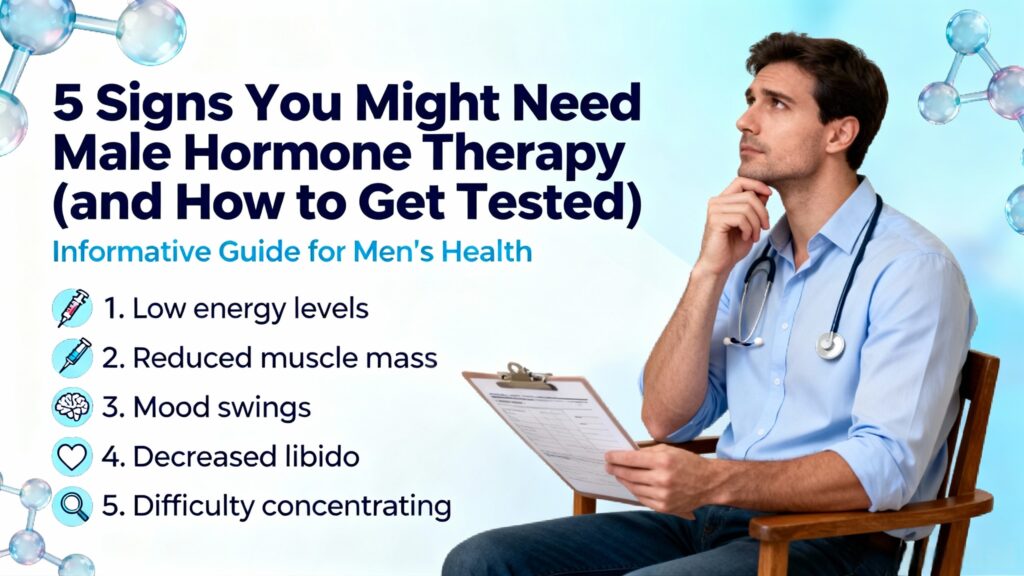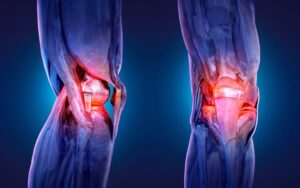
As men age, it’s completely natural for hormone levels—especially testosterone—to begin declining. However, when this drop starts to impact your energy, mood, or overall quality of life, it might be more than just “getting older.” Male Hormone Therapy (MHT), also known as Testosterone Replacement Therapy (TRT), is a medical treatment that helps men restore balance and feel like themselves again.
If you’ve been feeling “off” lately but can’t quite put your finger on it, here are five key signs you might need hormone testing—and possibly Male Hormone Therapy—to reclaim your strength, focus, and vitality.
1. You’re Constantly Tired—No Matter How Much You Sleep
Fatigue is one of the most common yet overlooked symptoms of low testosterone. Even after eight hours of sleep, men with hormone imbalance often feel sluggish or drained throughout the day.
That’s because testosterone doesn’t just affect your muscles or libido—it also plays a key role in regulating your energy metabolism. When levels drop, your body struggles to maintain normal energy output, leaving you feeling chronically tired.
If coffee stops working and naps don’t help, it’s time to get your hormones tested. Simple blood work can reveal whether low testosterone is the culprit behind your ongoing fatigue.
2. You’ve Lost Muscle Mass and Gained Fat (Especially Around the Belly)
Do you feel like your workouts aren’t paying off the way they used to? Or that your belly seems to grow despite no major changes in diet or exercise? This could be another sign of low testosterone.
Testosterone is a key anabolic hormone—it helps your body build and maintain lean muscle tissue. As levels drop, it becomes harder to gain muscle and easier to accumulate body fat, particularly around the midsection.
According to studies, men with low testosterone often experience increased fat storage, reduced muscle tone, and slower recovery after workouts. If your body composition has changed without an obvious reason, it might be time to discuss Male Hormone Therapy options with your healthcare provider.
3. Your Mood, Motivation, or Mental Clarity Have Declined
Hormones affect much more than your physical health—they have a direct impact on brain chemistry and mood regulation. Low testosterone levels are commonly linked with:
- Irritability and mood swings
- Anxiety or mild depression
- Loss of focus and mental sharpness
- A decline in motivation or drive
Many men notice they’ve become less enthusiastic about things they used to enjoy or feel “mentally foggy.” This emotional and cognitive shift often happens gradually, making it hard to notice at first.
Male Hormone Therapy helps correct the chemical imbalance that leads to these issues, often improving not just energy and libido but also mental well-being and motivation.
4. Your Libido and Sexual Performance Have Changed
Perhaps the most obvious—and most sensitive—indicator of hormonal imbalance is a change in sexual desire or performance.
Low testosterone can reduce libido, make erections less frequent or firm, and increase recovery time between sexual activity. This can understandably affect confidence and relationships.
However, it’s important to note that these changes don’t mean you’ve “lost your masculinity.” They’re biological and highly treatable. In fact, one of the biggest benefits of Male Hormone Therapy is restoring sexual vitality and confidence.
If this is something you’ve been struggling with, it’s worth having a discreet conversation with your doctor or a hormone specialist about your options.
5. You’re Experiencing Unexplained Weight Gain, Hair Loss, or Sleep Problems
Hormonal imbalance can trigger a chain reaction in your body. For instance, low testosterone can cause:
- Increased body fat and fluid retention
- Thinning hair or a receding hairline
- Restless sleep or mild insomnia
All these symptoms can add up, making you feel less like yourself. Since these issues can also overlap with stress or thyroid disorders, it’s important to confirm what’s truly happening through hormone testing.
How to Get Tested for Hormonal Imbalance
If you suspect you might have low testosterone, the next step is simple: get tested.
Step 1: Consult a Qualified Practitioner
Start by booking an appointment with a hormone specialist or men’s health clinic. They’ll review your symptoms, lifestyle, and medical history.
Step 2: Get a Blood Test
A standard hormone panel measures levels of total and free testosterone, along with other key hormones such as DHEA, estrogen, and cortisol. Testing should ideally be done in the morning when testosterone peaks.
Step 3: Review Your Results and Discuss Treatment Options
If your testosterone levels are below the healthy range, your doctor might recommend Male Hormone Therapy. Depending on your specific needs, treatment can include:
- Testosterone injections or gels
- Hormone pellets
- Bioidentical hormone replacement therapy (BHRT)
The goal is to restore balance naturally and safely, while minimizing side effects.
Additional Tips to Support Healthy Hormone Levels Naturally
Even before or during therapy, there are several ways to support your hormone health naturally:
- Eat nutrient-rich foods: Focus on lean proteins, healthy fats, and zinc-rich foods like pumpkin seeds and seafood.
- Exercise regularly: Weight training and HIIT workouts boost natural testosterone production.
- Sleep well: Aim for at least seven hours of quality sleep each night.
- Reduce stress: Chronic stress increases cortisol, which suppresses testosterone.
- Avoid excessive alcohol: It can disrupt hormone production over time.
While lifestyle changes can help, men with clinically low testosterone often need Male Hormone Therapy for sustainable results.
FAQs About Male Hormone Therapy
1. Is Male Hormone Therapy Safe?
Yes—when prescribed and monitored by a qualified healthcare provider, it’s generally safe. The key is regular blood testing to ensure your hormone levels remain balanced.
2. How soon will I notice results?
Many men report improved energy and mood within two to four weeks. Physical changes like muscle gain or fat loss may take two to three months.
3. Can hormone therapy improve my sex life?
Absolutely. Most men notice significant improvements in libido, performance, and confidence after beginning therapy.
4. Will I have to stay on hormone therapy forever?
Not always. Some men use it short-term to restore balance, while others continue long-term under supervision. Your treatment plan depends on your goals and medical evaluation.
5. Does insurance cover hormone therapy in Canada?
Coverage varies depending on your province and provider. Some plans cover testing and treatment, while others may not. Always confirm with your insurance company.
Conclusion
Feeling tired, foggy, or unlike yourself isn’t something you just have to accept. If these five signs sound familiar, it’s time to take action. Male Hormone Therapy offers a scientifically backed, highly effective way to restore your balance and reclaim your vitality.
At Aurora Compounding Pharmacy, expert pharmacists and healthcare partners specialize in personalized hormone therapies tailored to your unique body chemistry. With accurate testing, safe formulations, and ongoing support, they help men across Canada rediscover their energy, focus, and confidence.
Don’t let low testosterone hold you back—consult a trusted professional today and start your journey toward better health, strength, and well-being.


